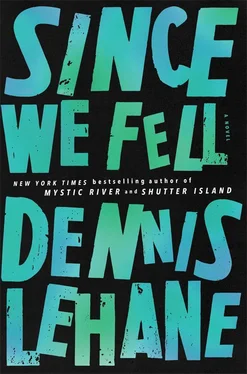Dennis Lehane - Since We Fell
Здесь есть возможность читать онлайн «Dennis Lehane - Since We Fell» весь текст электронной книги совершенно бесплатно (целиком полную версию без сокращений). В некоторых случаях можно слушать аудио, скачать через торрент в формате fb2 и присутствует краткое содержание. Город: New York, Год выпуска: 2017, ISBN: 2017, Издательство: Ecco, HarperCollins, Жанр: Триллер, roman, на английском языке. Описание произведения, (предисловие) а так же отзывы посетителей доступны на портале библиотеки ЛибКат.
- Название:Since We Fell
- Автор:
- Издательство:Ecco, HarperCollins
- Жанр:
- Год:2017
- Город:New York
- ISBN:978-0-06-212938-3
- Рейтинг книги:5 / 5. Голосов: 1
-
Избранное:Добавить в избранное
- Отзывы:
-
Ваша оценка:
- 100
- 1
- 2
- 3
- 4
- 5
Since We Fell: краткое содержание, описание и аннотация
Предлагаем к чтению аннотацию, описание, краткое содержание или предисловие (зависит от того, что написал сам автор книги «Since We Fell»). Если вы не нашли необходимую информацию о книге — напишите в комментариях, мы постараемся отыскать её.
is a novel of profound psychological insight and tension. It is Dennis Lehane at his very best.
Since We Fell — читать онлайн бесплатно полную книгу (весь текст) целиком
Ниже представлен текст книги, разбитый по страницам. Система сохранения места последней прочитанной страницы, позволяет с удобством читать онлайн бесплатно книгу «Since We Fell», без необходимости каждый раз заново искать на чём Вы остановились. Поставьте закладку, и сможете в любой момент перейти на страницу, на которой закончили чтение.
Интервал:
Закладка:
No? Rachel thought. You shoulda seen me yesterday.
“I’m telling you because you’ll make sure he comes back for me.” She indicated the baby. “For us.”
Haya was back in character when she asked Brian if Caleb was alive or not as Brian went over the game plan for what to do if anyone came calling while they were out.
Brian lied to her as Rachel had. “No. He’s fine.” Then he asked Haya, “Which shade do you pull?”
“The orange,” she said. “In...” She pointed.
“The pantry,” Brian said.
“The pantry,” she repeated.
“And when do you pull it down?”
“When you... text.”
Brian nodded. He reached his hand across the kitchen table. “Haya? It’s gonna be all right.”
Haya stared back at him. She said nothing.
Cumberland Savings and Loan was, as advertised, a family-owned business with a history in Providence County, Rhode Island. The strip mall that abutted it had been, until the late 1980s, farmland. Most every bit of land in Johnston, Rhode Island, had once been farmland, and that’s who the Thorp family had originally gone into the banking business to serve — the farmers. Now the strip malls were overtaking the farms, Panera had replaced the produce stands, and the farmers’ sons had long since declined a seat on the tractor in favor of a cubicle in an industrial park and a split-level ranch with travertine countertops.
The Panera was doing a bang-up business, judging by the number of cars out front. The bank, on the other hand, had fewer cars when she pulled into its lot at nine-thirty in the morning. She counted eleven cars in the lot. Two were close to the front door in designated spots — a black Tesla in the “Bank President” spot, a white Toyota Avalon in the “Cumberland S&L Employee of the Month” spot. The Tesla gave her pause — when Brian had described Manfred Thorp she’d pictured a doughy suburban yokel in a butterscotch sport coat and a cornflower tie, maybe with man boobs and a double chin. But the Tesla didn’t fit that image. She scratched her nose to obscure her lips from anyone who could be watching. “Manfred drives a Tesla?”
Brian, lying on the backseat under a painter’s tarp, said, “So?”
“Just trying to picture him.”
“Dark hair, young guy, works out.”
“You said he was middle age.” She scratched her nose again and spoke into her palm and felt ridiculous.
“I said almost middle age. He’s, like, mid-thirties. What do you see in the lot? Pretend you’re talking on your cell.”
Ah. He had mentioned that.
She lifted her cell to her ear, spoke into it. “The two cars by the front door. Four other cars in the center of the lot. Five employee cars against the slope at the far end of the lot.”
“How do you know they’re employee cars?”
“They’re all grouped together at the edge of the lot when there are plenty of closer spaces. That usually means the section is for employees.”
“But Manfred’s car is by the doors?”
“Yup. Beside the employee of the month’s.”
“Seven employee cars? That’s too many for a bank this small. You see any heads in any of those cars?”
She looked. The knoll backed up to a great red maple that had probably been there when the first Puritans arrived. Its branches were long, its leaves abundant, and the five cars sitting underneath it could have been sitting under a bridge for all the sunlight that reached them. If there was a suspicious car among them, she would say it was the center car. The driver had backed into the spot. The other four cars were parked nose-in. The grille emblem told her it was a Chevy. By the length of it, she’d guess a four-door, but the interior was impossible to discern under the cover of that shade.
“Hard to tell,” she said to Brian. “They’re in the shade.” She reached for the gearshift. “Should I drive over?”
“No, no. You’re already parked. It’ll look weird. You sure you can’t see into the cars?”
“Pretty much. And if I stare too long and there is somebody in one of those cars, won’t it look suspicious?”
“Good point.”
She let out a long, steady breath. Her blood slithered through her veins; the tom-tom beat of her heart echoed in her ear canals. She felt like screaming.
“I guess there’s nothing to do but gut it out at this point,” he said.
“Great,” she said into the phone. “Great, great, fucking great.”
“There could also be someone inside the bank. Someone just sitting around leafing through brochures or something. They could have flashed a fake badge, told the bank they were staking it out because of blah-blah-blah. That’s what I’d do anyway.”
“Will the person inside be smart enough to spot a wig?”
“I don’t know.”
“Will they be smart enough to recognize me under a disguise?”
“I. Don’t. Know.”
“Is that all you got? A Hail Mary and I-don’t-knows?”
“That’s what most cons are made up of. Welcome to the club. Dues payable at the end of every month and don’t park on the lawn.”
“Fuck you.” She got out of the car.
“Wait.”
She reached back in for her bag. “What?”
“Love ya bunches,” he said.
“You’re an asshole.” She slung her bag over her shoulder and shut the door.
As she walked toward the bank, she resisted the urge to look across the parking lot where the five cars sat under the shade of the maple. By the position of the sun, she guessed she might catch the light right just as she reached the door, but she couldn’t conceive of a casual way to turn her head that far left. She caught her reflection in the front door — honey blond hair that fell to her shoulders and looked completely unnatural to her, though Brian assured her this was only because she wasn’t used to it yet; bright blue, alien eyes; dark blue skirt, peach silk blouse, black flats, the uniform of a supervisor at a medium-size software development company, which is what Nicole Rosovich claimed paid her bills. Her bra matched the color of the blouse; they’d decided on a push-up bra with just a hint of cleavage, not so much to be obvious, but not so little Manfred Thorp would refrain from stealing a glance every now and then. If it helped keep him from looking too closely at the rest of her, she would have agreed to waltz in there naked.
Ten steps from the front door now and all she wanted to do was turn and run. The recent history of panic attacks had at least prepared her for a body awash in hysteria — the Saharan tongue, the spastic heart, the electrified blood, every sight too sharp, every sound too loud — but she’d never had to function normally with a panic attack. But now if she didn’t fake calm at an Oscar-caliber level, she would die or be arrested. Wasn’t really a Door Number Three that she could see.
She entered the bank.
The history of the bank was documented on a plaque just inside the front door and in a series of photographs within the bank itself. Most of the photographs were tinted sepia even though the bank had been established in 1948 as opposed to 1918. There it was as two men in ill-fitting suits and too short, too florid ties cut a ribbon. There it was surrounded by miles of farmland. There it was surrounded by tractors and other farm machinery on what looked to be some kind of holiday.
The door to Manfred Thorp’s office was as old as the first photo. Its wood was thick and painted a reddish brown. The office’s glass walls gave way to wooden or faux-wooden blinds that were closed. No way to tell if Manfred was even in there.
The bank had no customer service station. She had to stand in line behind an elderly woman who sighed a lot until the two tellers dispatched both their previous customers at roughly the same time. The male teller, dark skinny tie over a red plaid shirt, nodded to the elderly woman. The female teller said, “Help you, miss?”
Читать дальшеИнтервал:
Закладка:
Похожие книги на «Since We Fell»
Представляем Вашему вниманию похожие книги на «Since We Fell» списком для выбора. Мы отобрали схожую по названию и смыслу литературу в надежде предоставить читателям больше вариантов отыскать новые, интересные, ещё непрочитанные произведения.
Обсуждение, отзывы о книге «Since We Fell» и просто собственные мнения читателей. Оставьте ваши комментарии, напишите, что Вы думаете о произведении, его смысле или главных героях. Укажите что конкретно понравилось, а что нет, и почему Вы так считаете.

![Деннис Лихэйн - Когда под ногами бездна [Since We Fell ru]](/books/25722/dennis-lihejn-kogda-pod-nogami-bezdna-since-we-fe-thumb.webp)










